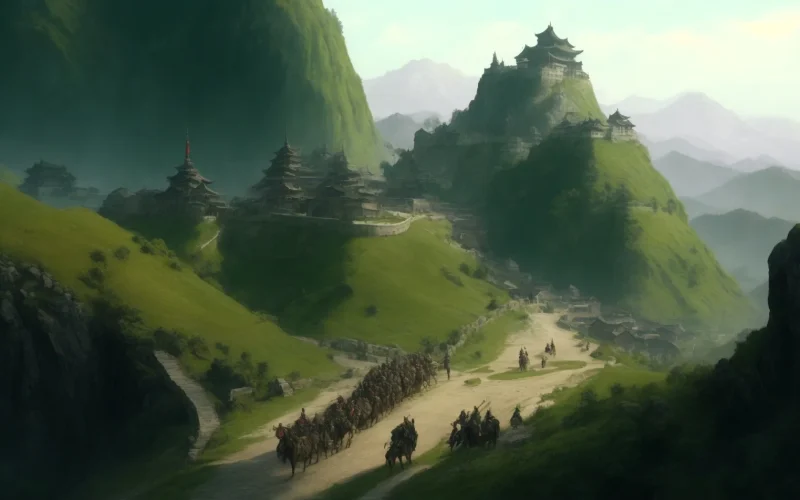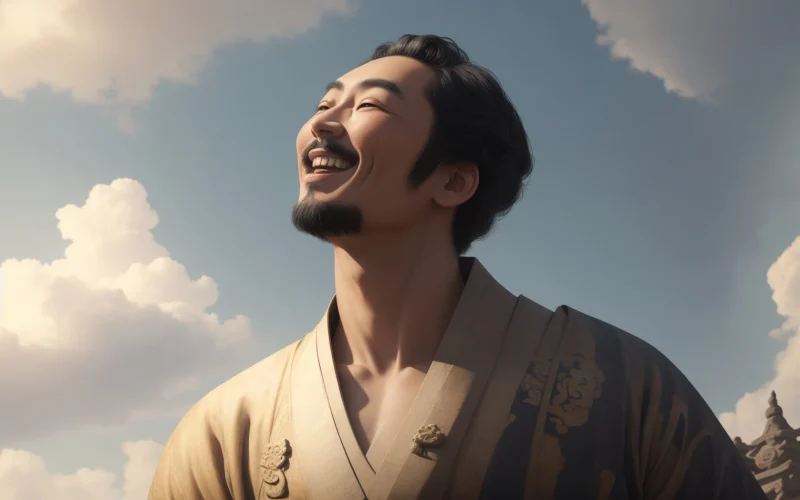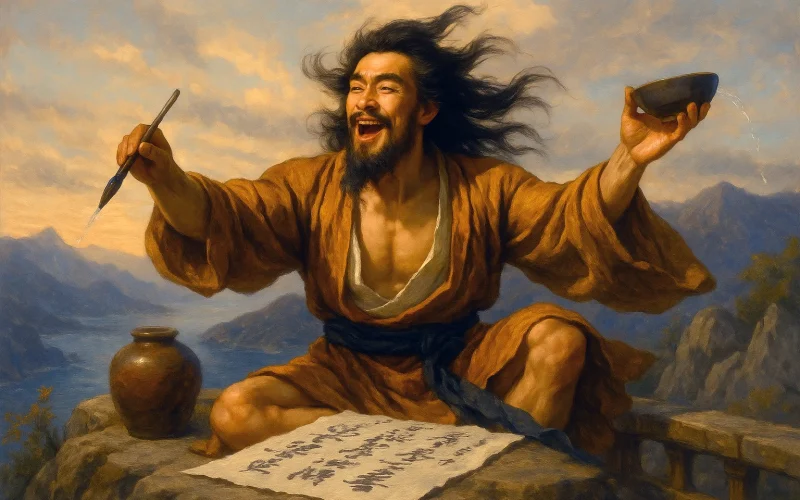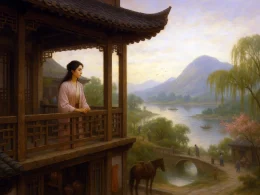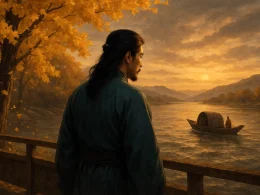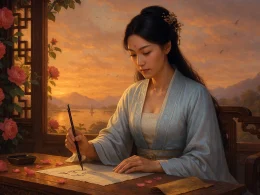When the Emperor came back from his ride, they had murdered Lady Yang - That passion unforgettable through all the suns and moons. They had led him to forsake her by reminding him Of an emperor slain with his lady once, in a well at Ching-yang Palace.
Original Poem
「马嵬坡」
郑畋
玄宗回马杨妃死,云雨难忘日月新。
终是圣明天子事,景阳宫井又何人。
Interpretation:
This poem was composed during the late Tang Dynasty, a period when the central authority of the empire had significantly weakened following the devastating An Lushan Rebellion, and regional warlords held increasing power. Amidst this turmoil, literati often reflected on historical events to express contemporary sentiments. The Mawei Slope incident refers to the events of 756 AD, when Emperor Xuanzong of Tang, fleeing westward during the rebellion, was confronted by mutinous imperial guards at Mawei Station who demanded the execution of Consort Yang, blamed for the crisis. Forced to appease his troops, the emperor reluctantly ordered her death. Zheng Tian's poem revisits this historical moment from a unique perspective, aiming to defend Emperor Xuanzong by portraying his decision as an act of sagely statesmanship, reflecting distinct political leanings and philosophical depth.
First Couplet: "玄宗回马杨妃死,云雨难忘日月新。"
Xuán zōng huí mǎ Yáng fēi sǐ, yún yǔ nán wàng rì yuè xīn.
The emperor turned his steed home—Consort Yang perished;
Their "cloud-rain" passion lingers, yet sun and moon renew.
This couplet succinctly outlines the incident's cause and consequence. "The emperor turned his steed home" implies his return to Chang'an after exile, while "Consort Yang perished" marks the tragedy at Mawei Slope. The poet employs the "cloud-rain" metaphor (a classical allusion to romantic entanglement from The Songs of Chu) to depict Xuanzong's lingering attachment. Yet "sun and moon renew" shifts to the macro perspective, symbolizing national recovery and political renewal—hinting at the prioritization of state over personal sentiment, laden with political nuance.
Second Couplet: "终是圣明天子事,景阳宫井又何人。"
Zhōng shì shèng míng tiān zǐ shì, Jǐng yáng gōng jǐng yòu hé rén.
In the end, this proved the enlightened sovereign's act—
Or who else might have faced the Jingyang Palace well?
Here, the poet explicitly justifies Xuanzong's decision as "enlightened," contrasting it with the fate of Chen Shubao, the last emperor of the Chen dynasty, who hid in the Jingyang Palace well with his concubine Zhang Lihua during the Sui conquest, only to be captured. By invoking this historical parallel, Zheng Tian suggests that Xuanzong's resolute action averted a similar catastrophe, framing the emperor as one who prioritized reason over emotion to salvage the dynasty. The couplet thus serves as both political exoneration and a commentary on the burdens of rulership.
Holistic Appreciation
Though brief, this poem masterfully blends narrative, lyricism, and political discourse. Unlike Bai Juyi or Du Mu’s sentimental elegies for Lady Yang, Zheng Tian adopts a rationalized political perspective, defending Emperor Xuanzong’s decision to "sacrifice emotion for reason" at Mawei. This approach stands apart among the many "Mawei poems" steeped in lament.
The contrast between lingering "clouds and rain" (a metaphor for past romance) and the "renewed sun and moon" (symbolizing national revival) serves dual purposes: it evokes nostalgia while redirecting focus to the greater good, embodying the poet’s stance that "emotion must yield to principle." The closing allusion to "Jingyang Palace’s well"—a historical reference to another emperor’s disgrace—offers measured praise for Xuanzong’s "decisiveness" within a "judging heroes by outcomes" framework. Yet this interpretation remains contentious. By attributing the rebellion solely to Lady Yang and sidestepping Xuanzong’s culpability, the poem adheres to Confucian historiography’s "gentle and restrained" tradition, revealing the compromises scholars made when confronting power.
Artistic Merits
This work distills complex history into two resonant couplets, showcasing remarkable concision. Allusions like "clouds and rain," "sun and moon," and "Jingyang Palace’s well" create profound tension and layered meaning. Unadorned yet rich in symbolic contrast, the poem mirrors past events against present realities, allowing readers to glimpse dynastic upheavals within its compact form—a rare fusion of epic grandeur and political critique.
Insights
History is not merely a record but an ongoing site of interpretation. The poet’s rational analysis of Xuanzong’s dilemma—separating personal affection from statecraft—though debatable, offers a thought-provoking political logic. It reminds us that rulers’ choices in turbulent times shape national destinies and spark enduring debates. Historical writing and interpretation must transcend immediate emotions to seek deeper truths and ethical clarity.
Poem translator
Kiang Kanghu
About the Poet
Zheng Tian (郑畋, 825 - 883), a native of Xingyang, Henan, was a Late Tang dynasty statesman and poet who attained the jinshi degree in 842. Though few of his works survive, his poetry—primarily political reflections—stands out for its vigorous structure amid the waning Tang poetic tradition. Pieces like Three Poems Written on Duty in Early Autumn exhibit a rare austere dignity, distinguishing him among his contemporaries.






